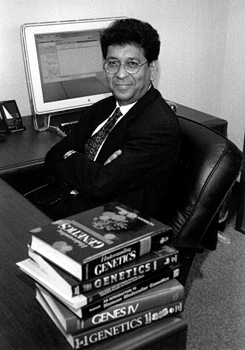|
|
Top Genetic Researchers To ConveneBy Greg RienziThe Gazette |

There is perhaps no more exciting, and controversial, topic in science these days than genetics. In deciphering the human genome, scientists are uncovering the basic set of inherited instructions for the development and functioning of human beings, the understanding of which has profound implications for medicine.
Realizing the need to harness genetics and genomics for the treatment of human disease, the School of Medicine in 1999 announced the formation of the McKusick-Nathans Institute of Genetic Medicine. Now in its first full year of existence, the institute will host its inaugural symposium, intended to highlight recent genetic discoveries and their impact on the future of medicine. The symposium, titled "Human Genetics and Genomics," will be held from 8:30 a.m. to 5:30 p.m. on June 29 in the Wood Basic Science Building, JHMI campus.

|
| Aravinda Chakravarti, first director of the McKusick-Nathans Institute |
The event brings together at Hopkins an all-star cast of genetic researchers, many of whom played a pivotal role in the Human Genome Project, the international research effort that this year successfully completed the mapping and sequencing of human DNA.
Aravinda Chakravarti, director of the McKusick-Nathans Institute of Genetic Medicine, says that while it is still too early to discuss the fledgling institute's progress, the symposium provides the perfect time to reflect upon both where genetic research has been and where the future of the institute lies.
"I felt it an apt time not only to celebrate the institute's beginnings but to articulate how genomics might be used for the study and understanding of human disease," says Chakravarti, who along with Edward D. Miller, CEO of Johns Hopkins Medicine, will give the symposium's introductory remarks. "Genomics is as much a point of view as it is a set of tools. The various scientists we are bringing together exemplify the broad aspects of this field."
Chakravarti says that in the field of medicine, genetics has become a common language, a basic science that ties the various disciplines together. He says you don't have to look further than the Institute of Genetic Medicine itself, which unites nine centers and scores of physicians at Hopkins, to see the consolidating effect genetics can have on medicine.
With eight symposium speakers focusing on a variety of topics, Chak- ravarti says the event holds something for everyone.
The day kicks off with Eric Lander, a professor of biology at MIT and director of the Center for Genome Research at MIT's Whitehead Institute. Lander, whose topic is "The Human Genome and Beyond," pioneered the development of genomics and computer technologies for mapping and sequencing the human genome and for exploring the genetic origins of common and complex disorders such as heart disease and cancer.
The other symposium speakers are, in order, Svante Paabo, director of the Genetics Department at the Max Planck Institute in Leipzeig, Germany; Hopkins' Barton Childs, professor emeritus in pediatrics at the School of Medicine; Francis Collins, director of the National Human Genome Research Institute; Susan Lindquist, an investigator at the Howard Hughes Medical Institute in Chicago; Edward Rubin, a researcher at the Lawrence Berkeley National Laboratory; and Lee Hartwell, director of the Fred Hutchinson Cancer Research Center in Seattle. Among the topics are Childs' "Genomic Medicine" and Lindquist's "From Mad Cows to 'Psi-chotic' Yeast: New Paradigms in Genetics, Disease and Evolution."
"It is sure to be a very exciting day. This symposium will be of wide interest, not only to geneticists but to cell biologists, biochemists and all our colleagues in the hospital and the clinical departments," says Chakravarti, an expert in bioinformatics, who began his stewardship of the institute on Sept. 1, 2000.
The Institute of Genetic Medicine is named for two Hopkins pioneers in genetics research, Lasker Award-winner Victor McKusick, University Professor of Genetics, and Nobel laureate Daniel Nathans, a molecular geneticist and interim president of the university, who died in 1999. Currently housed in two locations at the JHMI campus, the institute will move sometime in 2003 into its permanent home, the 10-story research building currently being constructed at North Broadway and Madison Street.
McKusick, who is credited with developing genetics as a recognized medical specialty, will wrap up the event with a presentation titled "Perspectives."
The symposium is free and open to the Hopkins community.
| GO TO JUNE 25, 2001 TABLE OF CONTENTS. |
| GO TO THE GAZETTE HOME PAGE. |